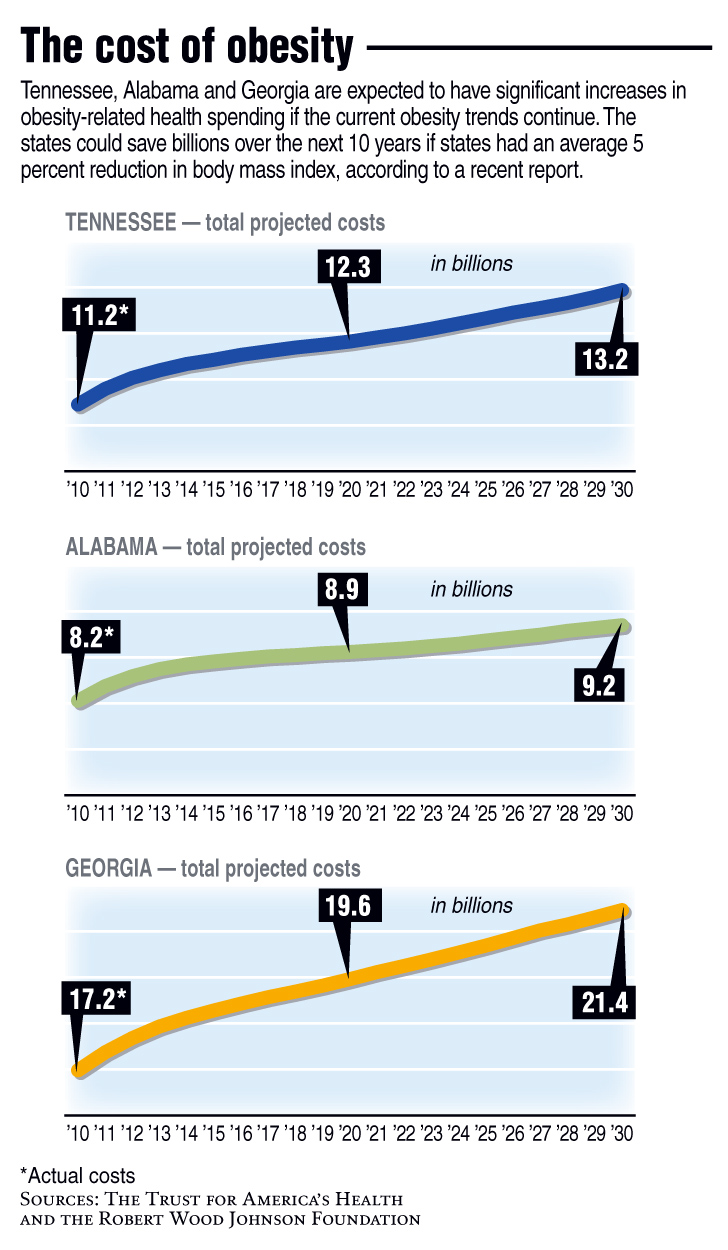Health aside, obesity costing U.S. billions
Friday, January 1, 1904
Obesity isn't only a health issue, it is also an economic problem costing Americans billions of dollars every year.
And -- unless current trends slow -- costs will rise even more over the next decades.
Tennessee could spend more than $12 billion a year on obesity-related health costs by 2020 and Georgia could spend nearly $20 billion, according to a study released Tuesday. Alabama is projected to spend nearly $9 billion annually in less than eight years.
For the first time, the annual "F as in Fat" report includes an analysis that forecasts obesity rates over the next 18 years for each state and the likely rise in both obesity-related diseases and health care costs. The report, compiled by the Trust for America's Health and the Robert Wood Johnson Foundation, also looks at potential savings if states could lower obesity rates.
"Real change is possible; we know what it takes to win," said Jeff Levi, executive director of Trust for America's Health.
During a conference call to discuss the results, Levi stressed the impact of small changes in obesity numbers. For example, reducing a state's average body mass index by only 5 percent could save billions of dollars over 10 years, the study showed.
Those changes can be done through small things, he said, such as exercising 20 minutes a day or cutting out soft drinks.
"We're not talking about a total transformation," he said.
Increases in the obesity rate have slowed in the last few years for some states, but not a single state lowered its obesity rates. According to predictions in the study, if current trends continue, more than 44 percent of adults could be obese by 2030. Some states could have more than 60 percent of obese adults.
Those numbers mean an increase in diabetes, hypertension, strokes, cancer and arthritis in every state, the study found.
For states dealing with already-ballooning health care costs, talking about the economic impact of the problem is a way to get the attention of lawmakers and businesses, officials said.
"We think it's important the people understand the problem," said Georgia Department of Public Health spokesman Ryan Deal. "We're not talking about an endless amount of money."
Georgia launched an obesity initiative earlier this year called "Georgia SHAPE," he said.
Tennessee launched the Obesity Task Force in 2007, and Gov. Bill Haslam has listed the issue as a priority, promising money in the budget next year to target obesity, said task force director Joan Randall.
Officials in both states said they do not have information on how much they are spending to target obesity, a number that is difficult to track because so many public, nonprofit and private groups are involved in the initiative. Tennessee has more than 700 entities involved in the Obesity Task Force initiatives, Randall said.
Federal funding, state funding, grants and private funding all play a role, officials said.
"This is a priority," Randall said.
INFORMATION
• The "F as in Fat" report - www.healthyamericans.org; www.rwjf.org
• Tennessee and Georgia's efforts to reduce obesity - www.georgiashape.org; www.eatwellplaymoretn.org

